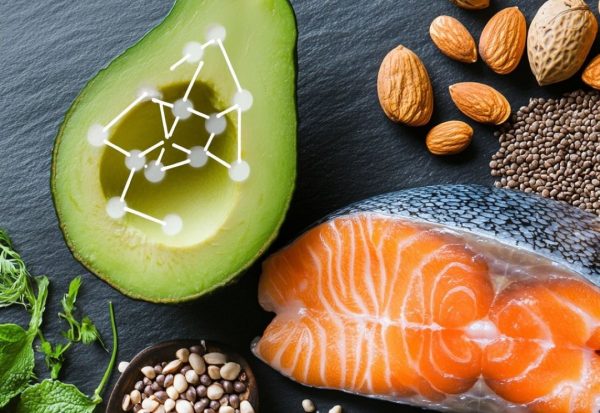Fatty acids make fat. Most people thing that is a bad thing, but it’s not.
Good fatty acids are necessary for energy metabolism, which is critical to your body’s ability to burn fat as an energy source. Plus, fatty acids give your body the capacity to absorb fat-soluble vitamins and nutrients. Fatty acids are absolutely necessary for your body to survive.
The good fats are called essential fatty acids.
Why are they essential? Because they are absolutely necessary for good health, but your body can’t make them. You have to get them from the foods you eat.
Let’s Get Essential!
Omega-3s are great. They’re anti-inflammatory. They keep the lining of the arteries smooth, reduce blood pressure and help with good HDL. They keep platelet aggregation down to a minimum, so that you have less of a chance of blood clots.
I frequently use omega-3 fish oil to decrease people’s triglycerides. It can have a massive effect. When someone takes 1,300-1,500 mg a day of a good fish oil, it is going to reduce their triglycerides dramatically.
Omega-3s are great for your retina. So you have better eyesight. If you eat sardines, herring and oily fish like mackerel you’re getting enough omega 3s, and you have less of a macular degeneration risk.
They are also good for your skin, hair and hearing, and help with cognitive decline, depression and anxiety.
That’s a lot of great things from a single nutrient, isn’t it?
The best source of omega-3s is fish, particularly fatty fish and small fish. If you don’t like fish, you can always use a fish oil supplement.
The Problem with Essential Omega-6 Fatty Acids
Your body needs omega-6 fatty acids too. But in a much lower quantity. When your omega-3s and omega-6s are unbalanced, your body will be more inflamed. That’s because omega-3s are basically anti-inflammatory while omega-6s are inflammatory.
And it’s a problem. Today, too many people are getting a lot more omega-6 fatty acids than omega-3s. You can blame fried foods, margarine and the vegetable oils that are found in almost all processed and packaged foods.
At the same time, the commercial meat available to us has a much higher level of omega-6 than it used to. That’s because it’s cheaper to feed livestock grains instead of letting them roam to eat grass. So when you eat meat that’s not grass-fed, you’re getting even more omega-6s.
But if you balance things out by getting your omegas from natural and healthy sources, inflammation shouldn’t be a problem.
So it’s really a good idea to avoid those packaged foods, fried foods and margarines and commercial meats. Instead, and get your omega-6s from natural sources. Extra virgin olive oil, avocados, walnuts, flaxseed oil and chia are all high in these good fatty acids.
And remember! Always try to buy grass-fed meat, wild-caught fish and organic produce.
SOURCES:
Di Pasquale MG. The essentials of essential fatty acids. J Diet Suppl. 2009;6(2):143-61.
Shearer GC, et al. Fish oil — how does it reduce plasma triglycerides?. Biochim Biophys Acta. 2012;1821(5):843-851.
SanGiovanni JP, et al. The relationship of dietary omega-3 long-chain polyunsaturated fatty acid intake with incident age-related macular degeneration: AREDS report no. 23. Arch Ophthalmol. 2008;126(9):1274-1279.



